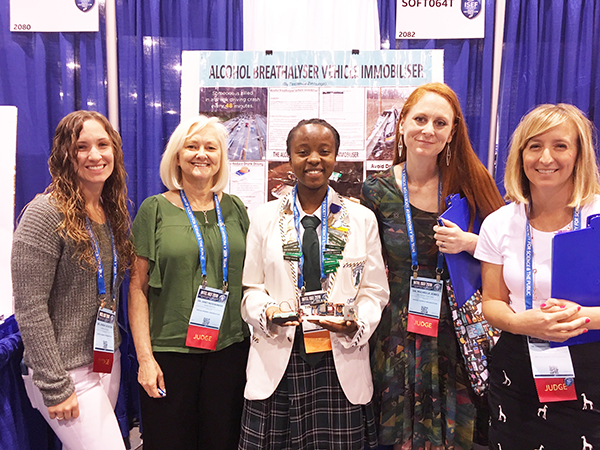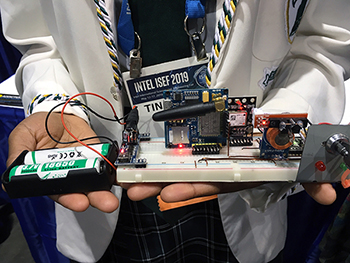 Tinotenda Zimhunga and Rufaro Mutogo
Tinotenda Zimhunga and Rufaro MutogoProject: Alcohol Sensors
About the Project:
Zimbabwe, Africa is the home of beautiful safari parks, and the gorgeous Victoria Falls, which attracts tourists from all over the world. It is also the home of 16 million people who lead regular lives with many of the challenges faced by other countries all over the world, including the United States. One of those challenges is drunk and drugged driving.
Fortunately, Zimbabwe is also home to 18-year-old Tinotenda Zimhunga and 17-year-old Rufaro Mutugo, two young scientists who, in the spring of 2019, were attending Chisipite Senior School in the country’s capital city Harare. Worried about the number of deaths caused by drunk driving every year, the pair wondered if they could improve upon systems that can be installed in cars that prevent people from driving if their breath tests over the legal limit of alcohol.
These systems, called alcohol sensors, are installed in cars for people who have struggled with impaired driving in the past, but they added a new twist.
 L to R: Judges Drs. Jonna Jackson and Janet Neisewander, Tinotenda Zimhunga, Judges Drs. Michelle Jobe and Cassandra Gipson-Reichard
L to R: Judges Drs. Jonna Jackson and Janet Neisewander, Tinotenda Zimhunga, Judges Drs. Michelle Jobe and Cassandra Gipson-ReichardQ&A with Tinotenda
- What gave you the idea to create an Alcohol Breathalyzer Immobilizer?
-
My parents were nearly in two disastrous car accidents due to other drivers who were drunk---in the space of about 2 weeks. I found that I was fearful whenever a loved one was going out, and I didn’t like feeling that way. I was motivated to try to help not only myself, but also other families, to live with one less fear of the dangers on the road.
- How does it work?
-
 Tinotenda holds the device that tests for alcohol levels in the breath; sends a signal to the car’s ignition; and a text to emergency contacts.
Tinotenda holds the device that tests for alcohol levels in the breath; sends a signal to the car’s ignition; and a text to emergency contacts.We have implemented an alcohol sensor into a software system called Arduino. Our circuit includes a light that represents the car. The light is initially on; that tells us the car is fully functional, and you can ride off into the sunset if you please. The driver enters the car and has to actively exhale into the alcohol sensor. The sensor detects the alcohol level in the person’s breath and the software assesses that level. When the alcohol level is over the legal limit, the light switches off, and the engine is shut down.
- What makes your sensor different from other breathalyzers?
-
The mechanism created is very similar to how ignition interlocks work. However, I decided to “give the car a phone” so that when the ignition is deactivated, it can send a message. With a GPS (Global Positioning System) and a GSM (Global System for Mobile Communications), the car can send a text that includes the coordinates of the driver’s location and an ID number to the ICE (In Case of Emergency) contacts and to the police. The ICE contacts can pick up the driver, who doesn’t spend a night stranded at a local bar, and the police can keep track of those who are a potential danger on the road.
- What were some of the technical challenges making this device?
-
My initial plan was to take a chemistry focused approach like what’s used in other alcohol Breathalyzer tests (ethanol + potassium dichromate + sulfuric acid = chromium (III) sulphate + acetic acid + potassium sulphate + water). This would have involved using corrosive chemicals and mixing electricity with liquids, which can be dangerous. It also would have produced waste products that are difficult to dispose of. Even with optimum conditions, the likelihood of the reaction we needed to occur was too low and the idea was a bit farfetched. However, once I found my mentor, Mr. Paolo Grotto, I managed to bring the idea to life. He is a physics and coding teacher, and he had the materials we needed.
- Tell us about your hometown, your country, and your school.
-
I’m blessed to be from a country as beautiful and as peaceful as Zimbabwe, where the people have a general culture of working hard and striving for a better future, despite the struggles we face. I go to Chisipite Senior School, a private, all-girls school with an ethos that promotes love and service in leadership. Chisipite pushes its girls not only to reach their full potential but also to explore other areas of interest. It nurtures well-rounded women and leaders of tomorrow.
- How does your community feel about women becoming scientists?
-
As I mentioned before, Zimbabweans value hard work, so almost every adult I encounter encourages me to take my education seriously. I’m lucky to be born into a family that greatly values education. My grandmother sweated for all her children to get an education despite the rather difficult circumstances she was under. My mother and sisters were determined to get into the health sector and work in the city of Harare. A female scientist is well respected in our community, so I can safely say that our community has embraced the idea of education for girls and women.
- If you could continue this research, what would you do next?
-
I’d like to implement the same procedure as in passive alcohol sensors, where the driver does not have to actively exhale into the sensor. This eliminates any chances of cheating the system, and it allows continuous detection of the alcohol in the car’s atmosphere (in case the driver thinks they can drink while driving).
The alcohol sensor that I used (MQ3 Alcohol sensor) can also detect other gasses such as other forms of alcohols, aryl compounds, and some alkanes. Those are common compounds you’d find in some of the everyday products we use. So, I would like to do further research on finding or creating an ethanol-specific alcohol sensor, because that’s the type of alcohol a person consumes.
Furthermore, I’d like to research the claim that a person can “sweat out” alcohol. You sweat out diacetic acid, the waste product after ethanol has been metabolised. I would want to use the same technicalities in the alcohol sensor to burn the diacetic acid to acetic acid, and then have the same reaction take place, with the same outcome of deactivating the car.
The plan is to place the same layers of metal inside the steering wheel, so that when the driver person holds it, the diacetic acid in the sweat on their hands will seep through the surface of the steering wheel. The same circuit will be initiated, and the car won’t start.
I would also advocate for the same principle to be used in industry, where workers who operate large machines need to concentrate very hard.
- What are your professional goals?
-
My plan is to enter the medical field as a doctor (I haven’t decided on a specialisation yet). One thing I’m sure of, though, is that I want to find a remedy against viruses. As broad as it may seem, I do have some ideas that may have a chance against all viruses. So, I might end up in pathology. I am also passionate about all people having easy access to health care. I believe that everyone should have a shot at optimum health at any point in their lives.
Mix in opening a bakery, too, just to keep life a little bit sweeter.
